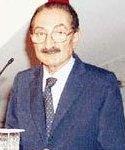 Bülent Ecevit was a turkish political leader and journalist born to a middle-class family in Istanbul in 1925. He began his political career in 1957 as an elected M.P. representing the Republican People's Party (CHP), a center-left party.
Bülent Ecevit was a turkish political leader and journalist born to a middle-class family in Istanbul in 1925. He began his political career in 1957 as an elected M.P. representing the Republican People's Party (CHP), a center-left party.
In 1961, he was appointed as Minister of Labor in the government led by Ismet Inönü, CHP's chairman, until 1965. Ecevit's career within the CHP progressed rapidly; elected as Party Secretary General in 1966, he led the party further left under the banner of "democratic socialism" arguing that it was the best way to defend Turkey against the threat of communism.
In March 1971, Bülent Ecevit resigned from office in response to his party's support of the new government formed by Dr. Erim after Süleyman Demirel had been pressured by the military coup to resign; Ecevit was protesting against the persistent intervention of the military in domestic politics. A year later, Ecevit replaced Inönü as Chairman of the CHP party which he led to victory in the 1973 General Elections. In 1974, he formed with the MSP, Necmettin Erbakan's islamist leaning party, a short-lived coalition government which tried to reduce the excesses of the police state created by the military, lifted the ban on opium production introduced in 1974 under U.S. pressure, sent troops to Cyprus in July 1974 to protect the local Turkish minority after the Greek coup in Athens, and took control of northern Cyprus. However, the coalition was not viable, and as a result, Ecevit resigned in November of the same year, replaced by Suleyman Demirel.
Cheered by the masses, Ecevit formed another government in January 1978, promising to put an end to the deepening economic crisis and the rising political violence. His government adopted unsuccessfully an economic stabilization program partly underwritten by the IMF (International Monetary Fund). Inflation and unemployment continued to soar dramatically while political and ethnic violence worsened with, on one hand deadly attacks on the Alevi minority by the fascists groups and, on the other hand, the birth of Kurdish separatism by PKK. Ecevit resigned in October 1979 and once again replaced by Suleyman Demirel.
Following the 1980 army coup, most parties were banned, among which the CHP. Bülent Ecevit eventually re-emerged in 1987 as head of the newly-founded DSP (Democratic Left Party, founded in 1985 by his wife Rahsan Ecevit). At first a minor party, the DSP became the leading party on the left of the political spectrum. It is generally opposed to free-market reforms, but approves of membership in NATO and further integration with Europe. Bülent Ecevit is well known for his nationalistic fervors.
The DSP has been part of a governmental coalition with ANAP from July 1997 until November 1998, Bülent Ecevit serving as deputy Prime Minister.
He then was called to form a government to last until the legislative elections brought forward to 18 April 1999. His minority government (the sixth since the 1995 general elections) - composed by DSP only - obtained a parliamentary majority thanks to the the support of ANAP and DYP.
Bülent Ecevit, who was already remembered as the Turkish Prime Minister who intervened Cyprus, suddenly became very popular when he announced on 16 February 1999 the capture of PKK leader Abdullah Ocalan. His party, DSP, jumped from 14,6% to 22% of the votes and became the first on the Turkish political scene after the general elections of April 1999, followed by the far-right Nationalist Action Party (MHP) of Devlet Bahçeli, the Virtue Party (Fazilet, islamist) and the Motherland Party (ANAP) of Mesut Yilmaz.
Following these elections, Ecevit was the Prime Minister and lead a coalition government with the MHP and the ANAP which had a clear majority (351 seats out of a total of 550) in parliament to pass economic reforms recommended by the International Monetary Fund (IMF). This coalition government faced its vote of confidence in parliament on June 6 and took it. In this government, DSP got the Foreign Ministry portfolio, while MHP got the Defense and ANAP the Interior.
Although he was a very erudite person who spoke perfectly English and read Sanskrit (he translated T.S. Eliott and Rabindranath Tagore in Turkish), he never got any university degree and consequently could not become President of Turkey.
Mr. Ecevit died of circulatory and respiratory problems on 5th of November 2006 in Ankara, after passing almost 6 months in coma in a hospital.

